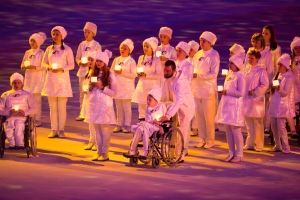by Michael Dougherty

Over nine days, Team USA – comprised of 80 athletes competing in Sled Hockey, Wheelchair Curling, Cross-Country, Alpine and Biathlon – received nine Bronze, seven Silver, and two Gold medals. The Golds were significant, not just unto themselves, but because Snowboarding had its inaugural year at the Paralympics. Also, Russia, the host nation, had its very first sled hockey team in competition. They were beaten by the Americans, in what was a repeat victory after their win over Japan at the 2010 Vancouver Games, also a first.
All of this played out in the shadow of Russia, a country that had previously denied the existence of disability, evidenced by a Russian official swore there were “no invalids in the USSR” during the Moscow Winter Olympics in 1980. Russia has made progress, making Sochi more accessible, with the hope that the rest of the country will follow suit. Russia rose to the occasion, making it easy to get around and providing an atmosphere of inclusion.
The Paralympics have come to represent the best in ability, shunting aside any stereotype of weakness and favoring fierce competition.

Athletes from 45 countries came to the coastal town of Sochi for the games, including Great Britain, the founder of the original Paralympics, and they came away with their first ever Gold with Kelly Gallagher’s win on the Visually Impaired Super G. This is only one story of triumph, among countless others.
At the closing ceremonies, IPC Chairman Philip Craven asked an excited crowd of thousands, “How are your barrier-free minds tonight?” The energy in the room at than moment made it clear the Paralympics had reached well beyond the framework of disability or even athletics. They stood, in that moment, for a coming together for all people to enjoy themselves and learn from each other. That was accomplished.

